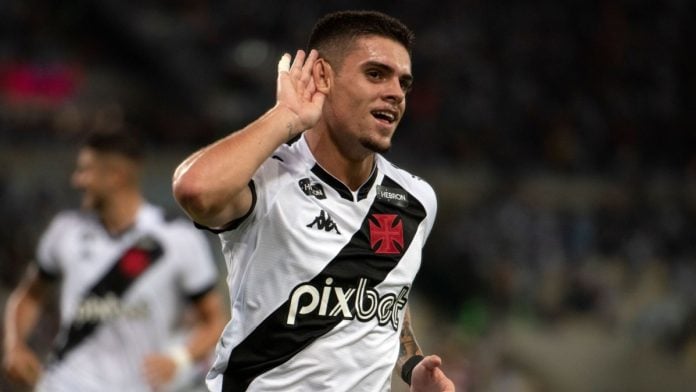Vasco da Gama is a football club which has been at the forefront of Brazilian sports since its foundation 130 years ago. João Pedro Dobes, the team’s Commercial Manager, explains how this vision is being taken into the modern era.
Speaking to SBC Noticias for the latest edition of the SBC Leaders magazine, Dobes offers insights into how Vasco da Gama is taking on changing times in Brazilian football. This includes adoption of new technologies, and adapting to a changing regulatory environment.
Brazilian football is facing a time of significant change with incoming betting regulations which will allow clubs to sign deals with the sportsbooks, preparing to launch in a soon-to-be-established nationwide gambling market.
“Sponsorships are beneficial to Vasco da Gama in many ways,” Dobes says. “Sponsorships are a way of differentiating the club’s revenues and strengthening it as a brand, connecting the fan to the sponsoring brand, and creating stronger links between the brand and its customer.
“The club generates value for the brand’s client through money-can’t-buy-experiences, the association of the sponsoring brand with Vasco, which is a centenary and victorious institution, the communication with Vasco’s extensive database, and the awareness generated by the brand’s exposure with Vasco in online and offline media.”
Betting sponsorships came close to being rejected in Brazil’s betting legislation, but Deputies and Senators ultimately decided to allow these partnerships – but arrangements will be subject to certain conditions around social responsibility.
Brazilian stakeholders may well have been paying attention to developments in European markets such as the UK and the Netherlands, where a public and political backlash against a perceived proliferation of betting marketing has been viewed as increasingly harmful.
“Involving players in activities related to responsible behaviour regarding the gambling industry is crucial.”
In Brazil, clubs are preparing to take responsible gaming standards very seriously. Dobes explains that a lack of financial education in Brazil has made responsible gaming a “key issue” for sports clubs and gaming firms alike.
He continues: “It’s important that both Vasco and the sports betting operators communicate consciously, informing the general public about the risks of sports betting and taking care not to give the impression that sports betting are an investment alternative, when in fact it should be a moment of leisure.
“When it comes to preventing match-fixing, Vasco has a strong internal policy on responsible gambling and preventing match-fixing. Our compliance department works hard to educate employees and footballers about the impact of such acts and the consequences they bring, having a conversation with all employees at least once a year.
“The commercial sector, which is responsible for managing all sponsorship agreements, works on a daily basis with the sponsoring sports betting operator and with the areas within Vasco that are responsible for curating and the content and communication that is created for the Vasco fans.”
This responsibility also needs to be factored in when drafting marketing campaigns, he adds. Again, the significance of European developments is hard to downplay here, with the UK, Netherlands and Belgium, among other countries, holding sports marketers to stricter standards when it comes to including players in any material.
Dobes adds: “Involving players in activities related to responsible behaviour regarding the gambling industry is crucial. Football players are role models for a large part of football fans, especially children.
“These players must be well aware of their impact over society, when it comes to their marketing campaigns, what is said off the pitch and who they are associating their personal brands to.”
“The technology sector, specially the web3 sector, has been growing once again.”
As Brazil prepares to launch its first nationwide betting market, clubs like Vasco da Gama are seeking the opportunities this milestone will bring.
Sponsorship revenue, as discussed above, is of course key, and the team has already worked to maximise its potential here by partnering with local operator Estrela Bet and international firm Betfair.
This does not mean that revenue is the only factor that needs to be considered.
“We select our sponsors thinking not only about the revenue that could be generated to Vasco da Gama but also on the brand alliance that is about to be created,” Dobes explains the club’s sponsorship approach.
“There are two ways of seeing in, we either try to partner with a strong and traditional brand in the sports betting market or we look for a newcomer that is innovating and bringing in new ideas to work with the football club.
“Obviously, the brand will always have to go through Vasco da Gama’s and the 777 Group due diligence process.”
Turning away from betting sponsorships, Dobes touched on the other partnerships Vasco has been evaluating. Web3 is a sector in particular which has been increasing in visibility in global sports, and Vasco has been taking notice.
Various clubs in Europe have been engaging with Web3 – digital fan token partnerships with the likes of Sorare and Socios are perhaps the biggest examples – and this is also being seen in Latin America, via the likes of the Argentine Football Association (AFA) partnering with Binance, albeit dropping the association last year.
Dobes continues: “The technology sector, specially the web3 sector, has been growing once again, with some global partnerships being announced by some giant European clubs and it is, indeed, something Vasco has been taking a close look at.”
At this transformative time for Brazilian sports, football in particular, Vasco da Gama aims to be as innovative in 2024 as it was in 1898, when its players first took to the pitch.
Dobes believes that in order to achieve this, they need to bring the experiences of the past into the contest of modern tech-driven football business.





















